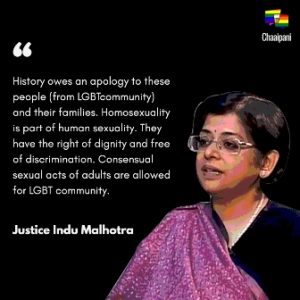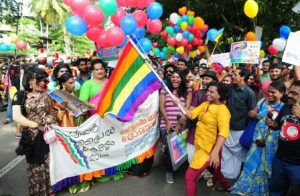Fight to ‘Let Love Be’ Not Over Yet
The big question: Has decriminalizing homosexuality changed the face of our society?

It’s been a year since the Supreme Court passed the historic verdict against Section 377 of the Indian Penal Code, thereby decriminalizing homosexuality. But how much has actually changed since then? Has there been any improvement for the LGBTQA community?
‘There has been more tolerance and acceptance of the community. A lot more people have become vocal about gay rights and gay sex. It’s not a taboo anymore’, said Barry Nathaniel Rodgers, features editor for a leading fashion magazine in Mumbai and a member of the LGBTQA community.
However, he added that although more and more people have come out since the verdict, complete acceptance in the society still seems to be a distant future.
‘I don’t think so there has been any major improvement; there has just been more awareness about gay rights. A lot of activists are pushing for marriage equality that is hopefully next on the agenda. However, that is going to be a lot more difficult because Indian society is just not ready for it. But there have been tiny improvements’, he added.
The scenario of homosexuality varies from metropolitan cities to small towns to villages. While there is still more of acceptance in the former, the latter is till date struggling with the whole concept.
‘I have a friend in Jaipur who recently came out to his dad because he was being forced to get married. His dad didn’t take it too well and even asked him to go to a conversion camp to seek therapy. My friend obviously didn’t go but he was considering it because he thought he had let his father down. He is petrified to tell his mother or sister about his sexuality. In fact, he feels that he is going to live a very lonely life. However, his father, who is from a much smaller town than Jaipur, has now eased into understanding him’, Barry said to Delhi Post.
The society still has many orthodox elements where most enjoy staring at homosexuals, making them uncomfortable and even passing lewd remarks. Despite the law, many from the community become victim to violence and harassment even by the police. There are families who still haven’t accepted their children from the LGBTQA community because of the social stigma attached to it. However, people from the community still see a silver lining and agree to have noticed a few positive changes since the verdict.
Also Read : Love In The Time Of Section 377
‘Once I was walking down Bandra and I saw two guys making out on a street corner, and no one dared to tell them anything. There were a bunch of guys looking at them obviously and a lot of them were pretty scared. I was passing by and I heard one of them say kuch mat bolna (don’t say anything) because we could get arrested now if we harass them’, Barry said.
He also said that conditions at the, workplace are improving as MNCs, and corporations have become inclusive and many also give benefits to gay people. However, Barry expressed serious concerns saying that within the community that there is a need for sensitization as many from the community are very oblivious about protection, safety as far as sex goes.
He further said that those who are in the closet need a safe environment to come out. ‘I am not judging them but it’s a very personal journey. It’s not for us or anyone to make them come out. Even if you suspect that they are gay, make the environment safe for someone to come out but don’t force them into coming out’.

Another member from the LGBTQA community Uttaran Fred Bhunia, an aspiring Architect from Kolkata told to Delhi Post that one good thing that has happened since the verdict is that the fight has become more mainstream now.
‘It has made people more aware. Now people from the community have a chance to use the law for their own benefit. Earlier there used to be a lot of extortion. The police used to extort money from people and threaten them if, for example, they were caught in the act. But now this can’t happen because it’s illegal and it’s okay to be gay’, said Uttaran.
He added that now people from the community are not scared to hang out in public. The meetings aren’t held in secret bars or late night parties. It’s much more in the open. ‘Lot of queer cafes have opened up in the country. The fact that it is going mainstream is making it more normalized’, he added. He also said that society really needs to move on because many still prefer to remain in the closet due to the fear that they won’t be accepted if they come out.
Sharing a personal experience of homophobia, Uttaran said, ‘My thesis this year was on the LGBTQ community, I had designed an LGBTQ community centre for Kolkata. During my first jury where I had to present my work, my jurors started saying that LGBT is all western culture, the people are not even biological, they are criminal, etc. My professor and I, we both retaliated and said that if you think they are criminal, it means that you are against the Supreme Court which has already issued that they are not criminals anymore’.
‘During my thesis, I had to struggle with the conservative ideas of these people but I fought and presented it to the final jury and it went really well’, he added.
Bittu KR, a Delhi-based scientist, a gender queer trans man and a founding member of Telangana Hijra inter-sex transgender Samiti, who has been active in the trans community for about 15 years said that not much has changed in terms of employment and other opportunities.
‘India’s trans and queer people are generally excluded from mainstream forms of work and are left with nothing except begging and sex work. They continue to suffer from employment discrimination, exclusion from all forms of education, housing, healthcare, etc.’, Bittu said to Delhi Post.
Also Read : Recognise Our Legal Gender And Lets Make A Trans Inclusive World Jannat Ali
‘The acts of violence certainly haven’t changed. The police who is the main section to abuse 377 against people continue to harass, round up working class queer and trans people’, she added. She also said that more than the law, it’s the family pressure due to which many are still in the closet.
‘The law has always had very little to do with why people stay in the closet. People stay in the closet largely because they worry that their families will feel social stigma and will direct that stigma at them. In some places, society is changing for the better in the sense that people are accepting of their queer and trans family members’. She added that caste is a major factor behind homophobia.
‘Homophobia is very strongly tied to the systems of caste patriarchy and capitalism. The idea that everybody should participate in compulsory heterosexuality and women should marry men in endogamy and bear offspring to whom the property will flow is what flourishes in this country’.
According to her, an overall revolutionary change is required in the social structure, where people can liberate themselves from the shackles of caste, patriarchy and capitalism.
